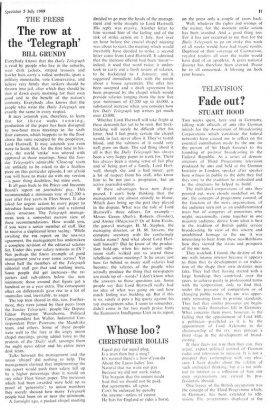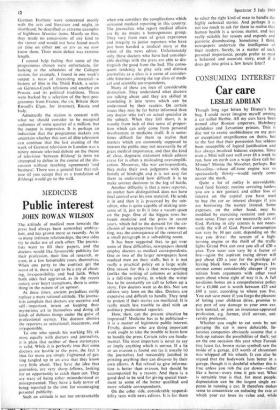TELEVISION
Fade out?
STUART HOOD
Two weeks spent, here and in Germany, talking with officials of ARD (the German
initials for the Association of Broadcasting Corporations which constitute the federal network) have caused me to reflect on the
essential contribution made by the BBC (in
the person of Sir Hugh Greene) to the founding of postwar broadcasting in the
Federal Republic. At a series of demon- strations of Third Programme television produced by ARD and held at the German Institute in London, speaker after speaker bore witness in public to the debt they feel they owe to the tradition he embodied and to the structures he helped to build.
The individual corporations of ARD, they pointed out, were closely modelled on the Bac; the concepts of programme control, of the function of the news organisation, of the audience seen not as an undifferentiated mass but of congeries of minorities who might, occasionally, come together in one majority audience, derive from what is best in the tradition of British public service broadcasting. In view of this sincere and uninhibited homage to the BBC it was interesting to hear from these neo-Reithians how they viewed the status and prospects of the BBC now.
They watched, I found, the destiny of the Bac with intense interest because it appears to them that its development is an indica- tion of the shape their own destinies may take. They feel that, having started with a large handicap they contrived, over the years, to achieve parity in professional terms with the corporation, only to find that, under the pressure of competition or of changing public tastes, the BBC was appar- ently retreating from its pristine standards. They feel that similar pressures are begin- ning to make themselves felt in Germany. What concerns them most, however, is the feeling that the appointment of Lord Hill, a politician—paralleled as it is by the appointment of Lord Aylcstone to the chairmanship of the ITA- may presage a third stage in the development of broad- casting.
If their fears are true then they can, they argue, expect political control of German radio and television to increase. It is not a prospect they contemplate with any plea- sure. I have doubts about the validity of such analogical thinking; but it is not with- out its interest as a reflection of how our own organisations are viewed by pro- fessionals abroad.
One legacy of the British occupation was the concept of the Third Programme which, in Germany. has been extended to tele- vision. The programmes displayed at the
German Institute were concerned mostly with the arts and literature and might, in shorthand, be described as extreme examples of highbrow Monitor items. Mostly on film, they made no concessions of any kind to the viewer and would not have found much air time on either BBC or ITV as we now know them. Their main defect was extreme length.
I cannot help feeling that some of the programmes chosen were unfortunate, for looking at the schedules of the Cologne station, for example, I found in one week's output a mass of interesting material—a history of film in the Third Reich, a series on German-Czech relations and another on Prussia and its political traditions. These were backed by a selection of the best pro- grammes from France, the us, Britain (Ken Russell's Elgar, for instance), Russia and Italy.
Admittedly the station is content with what we should consider to be marginal audiences of some quarter of a million; but the output is impressive. It is perhaps an indication that the programme makers are uncertain whether this sort of elite television can continue that the last evening of the week of German television in London was a ninety minute televised debate on the theme of television 'between Bildung' (a term we attempted to define in the course of the dis- cussion without reaching agreement) 'and business'. There was a general fear that cul- ture (if you accept that as a translation of Bildung) would go to the wall.



































 Previous page
Previous page